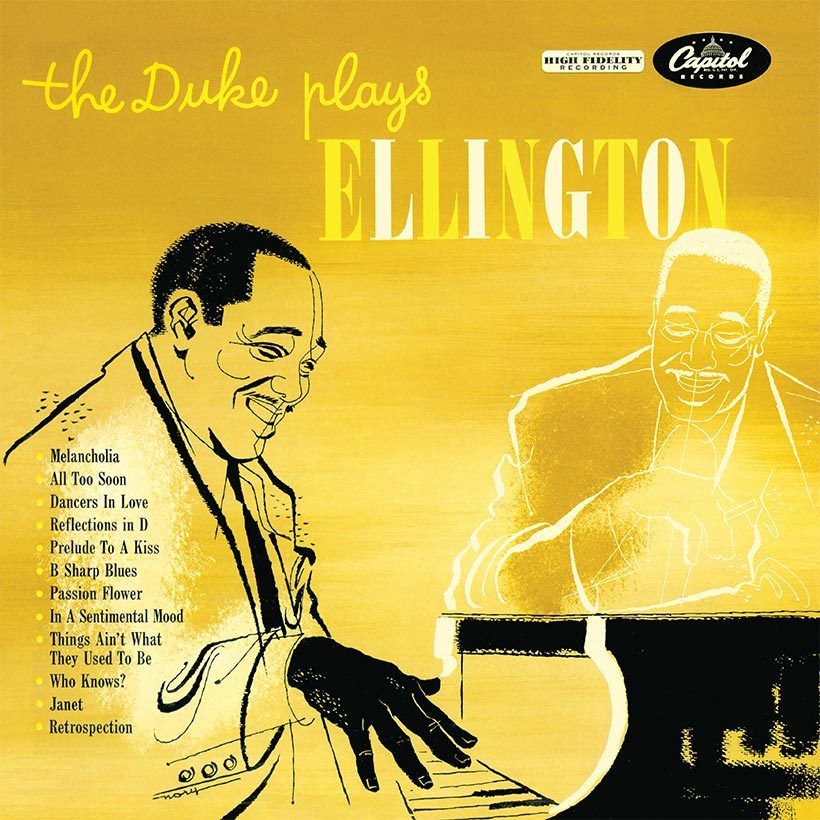‘The Duke Plays Ellington’: Piano Reflections By The Jazz Legend
Only a few albums focused on Duke Ellington’s abilities as a pianist. This is one of the best.

A veritable giant in the history of jazz and the early years of popular music, Duke Ellington is rightly revered for his abilities as a composer and bandleader, but the fact that he was also a dexterous and talented pianist with a unique style is often overlooked. Among the myriad albums released under his name during his long career, only a handful focused on his abilities as a pianist. One of the best was The Duke Plays Ellington (later renamed Piano Reflections).
The album was recorded on Monday, April 13, 1953, when the Washington, DC-born jazz aristocrat, then a few weeks shy of his 54th birthday, went into Hollywood’s Capitol studios with just a bassist (Wendell Marshall) and a drummer (Butch Ballard) to lay down eight tracks.
Listen to Piano Reflections now.
It was an intimate, low-key session that began with one of Ellington’s signature tunes, “In A Sentimental Mood,” which began life as a big-band instrumental in 1935 before becoming a vocal track after acquiring lyrics written by Manny Kurtz. Here, Ellington’s elegant, crystalline piano floats above a gently swinging backbeat propelled by Butch Ballard’s softly swirling brushes. Another Ellington classic to receive a minimalist piano trio makeover back in April 1953 was the urbane “Prelude To A Kiss,” a graceful piece first written in 1938 that was influenced by classical music.
Also familiar to Ellington fans was “Things Ain’t What They Used To Be” – revived as a midtempo blues on The Duke Plays Ellington – which was written by the pianist’s son, Mercer, in 1942. Elsewhere on the album, though, Ellington served up brand new material specially conceived for the album.
Blues influence
The influence of the blues on Ellington’s music is in evidence on the playful “B Sharp Blues,” where the pianist/composer uses dissonance to add a piquant quality to the melody. In acute contrast, the lovely “Reflections In D” is a floating ballad where dense patterns of lush chords create a dreamy soundscape. A more exotic mood is conjured by “Passion Flower,” a song that Ellington composed with one of his key collaborators, Billy Strayhorn (the Ohio-born composer of the all-time Ellington favorite “Take The A Train”).
As well as being able to create evocative tone poems, Ellington knew how to swing, as the propulsive “Who Knows” ably demonstrates with its bright, percussive piano lines. The closing song on the original album, “Janet,” also hurtles along at a rapid pace, though quickly changes gear and morphs into a meditative ballad with a gentle rhythmic undertow supplied by soft, pulsing brushes, before resuming the skittish character of its original tempo.
The Duke Plays Ellington was first released as a 10” LP on Capitol Records in 1954, but later, in 1958, when the more popular 12” vinyl had become the norm in the music industry, the album was expanded to accommodate four additional tracks which had been recorded on April 14, 1953. They were two haunting ballads, “Melancholia” and “Retrospective” – the latter was more ornate and dramatic in terms of its piano content – plus “All Too Soon,” a revamp of a 40s Ellington tune, and the jaunty “Dancers In Love,” defined by a descending chromatic line underpinned by a sprightly, stride piano rhythm.
A go-to album
In 1989, 15 years after Ellington’s death, The Duke Plays Ellington was finally reissued on CD for the first time, though it was renamed Piano Reflections and appeared on the Blue Note label. It was also bolstered with three previously unissued cuts (“Kinda Dukish,” “Montevideo,” and “December Blue”), all taken from a December 1953 session at Capitol studios.
More than half a decade on, The Duke Plays Ellington remains a go-to album if you want to hear Ellington’s considerable piano skills in full effect. It offers compelling evidence that the man born Edward Kennedy Ellington, in 1899, could have been successful as a jobbing pianist if his career as a bandleader and composer hadn’t taken off so spectacularly.












